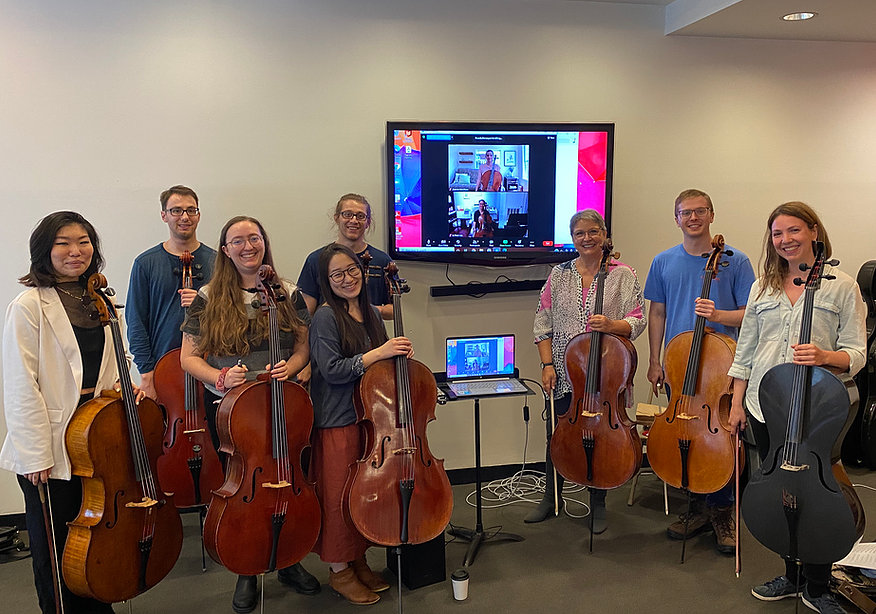Erica sees music education as simply another form of communication, believing that every relationship with a student is a unique one worth celebrating. Employing a student-focused and growth-mindset approach, she works with students of all ages and levels, tailoring her approach to meet students where they are at and help them progress towards their individual goals.
As an instructor, Erica has a multitude of varied experiences. She is currently cello faculty at Mimi Zweig’s Jacobs String Academy. Erica served as a Music Fellow from 2021-2022 at ArtistYear, an AmeriCorps program dedicated to closing the opportunity gap in the arts. As a teaching artist in a number of schools in Carbondale, CO, she facilitated general music and cello instruction through her service year. Additionally, she is experienced in asynchronous and virtual teaching during her time as a Morse Teaching Fellow at The Juilliard School. As a Juilliard Pre-College Orchestra Mentor, she coached larger ensembles by sitting in the orchestra section and doing hands-on work with the members. She has also taught numerous cello lessons and group classes to young cellists at the Start-Up Program at The School For Strings. Throughout her teaching experiences, Erica has continually emphasized “character first, ability second” (Dr. Shinichi Suzuki) and encouraged her students to feel empowered by taking ownership of their work.
Erica employs a primarily Suzuki approach in her private teaching, having completed teacher training in books 1-8 with Pamela Devenport and books 9-10 with Tanya Carey through the School For Strings. Erica’s major philosophical influences include individuals such as Dr. Shinichi Suzuki, Carol Dweck, Don Miguel Ruiz, and Bary Green. She divides her philosophy into four pillars: 1. “Character First, Ability Second,” 2. “Self Efficacy,” 3. “Work Ethic and Skill Development,” and 4. “Finding Joy In Music and the Learning Process.”
Character First
Pillar 1 hones in on the need to focus on an individual’s character first before thinking about musical talent and growth. Without self-fortitude and a trust in teacher or student, it is much more difficult for a student to learn. Being a musician means being an artist, and being an artist means self-expression. One wants what they are expressing to be beautiful and sincere; to make this happen, a self-understanding of one’s character is crucial.
Self Efficacy
Pillar 2 involves taking ownership of one’s work. In a world that perpetuates the “Fixed Mindset” (the idea that talent is innate and not cultivated), it can be tricky. The goal is to teach students that talent, or achievement, comes from the amount of effort they put into their work. Musicianship is not a “god-given” talent; it is a skill that one acquires after consistent and intentional effort. Anyone can learn to become a musician, and the aforementioned mindset (also known as “Growth Mindset”) frees a student from any societal or pre-conceived shackles.
Work Ethic and Skill Development
Pillar 3 outlines the work ethic that Erica aims to instill in her students. Taken from Bary Green’s “Inner Game” philosophy, it involves three aspects: Awareness, Will, and Trust. Awareness in not only one’s physical self, but also one's thought-process, is essential in improvement. There must be a will to make an improvement for the student to be able to put the work in. Check-ins with students occur frequently to discuss what the student’s goals in projects and cello playing are. Finally, trust in oneself and one’s work is vital in order to perform with ease.
Erica’s goal is to assist in students sharpening their awareness skills and giving them specific ways to practice so that their work can continue outside of the lessons. If a student is intentional about putting the work in and has a sense of trust in the process, they can perform with less anxiety and more confidence.
Finding Joy In Music and the Learning Process
Finally, one must have a joy in music as well as the learning process. This is where Pillar 4 comes in. Work is not easy to do if there is no desire or love for it. Whether a student’s goal is to become a professional performer or gain a new skill, at the heart of it all is an all-encompassing need for people to enjoy working at the instrument and enjoy listening to music. Erica’s goal is to spark excitement rather than intimidation in lessons so that students can go home feeling motivated and eager to continue their work on the cello.
